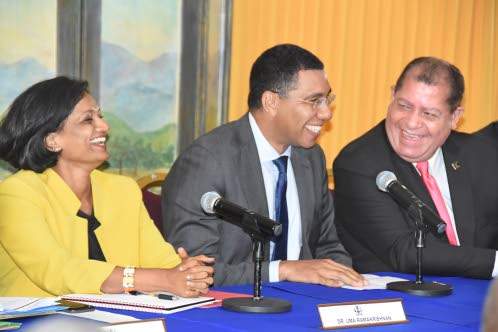Prime Minister Andrew Holness (centre), International Monetary Fund (IMF) team leader Uma Ramakrishnan, and Finance Minister Audley Shaw are all smiles at yesterday’s press briefing at Jamaica House at which the IMF gave a good assesment of the country’s economic performance. (Photo: Michael Gordon)
The International Monetary Fund (IMF) staff team, which has been in Jamaica for the last 10 days, has concluded that the economy is rebounding, despite weather swings.
All quantitative performance criteria and structural benchmarks at end of June 2017 were met, team leader Uma Ramakrishnan told a press briefing at Jamaica House yesterday.
She noted that growth has been positive for nine consecutive quarters, with strong performances especially in tourism, construction, and manufacturing. Unemployment reached 12.2 per cent in April 2017, a seven-year low, along with a sustained expansion in the labour force. For 2017/18, economic activity is projected to expand by 1.6 per cent, slightly lower than anticipated, as flooding adversely impacted agriculture.
“But, over the medium-term, economic expansion is expected to be around two to three per cent, as sustained reforms yield higher investment and productivity dividends,” she noted.
However, Ramakrishnan, who was giving her team’s assessment of the country’s performance over the last six months under the current Stand-by Agreement (SBA), indicated that achieving the target of a public sector wage bill of nine per cent of GDP by 2018/19, and passing the delayed public sector pension reform Bills are urgent for budgetary certainty and fiscal sustainability.
Asked about the IMF’s concerns about these challenges, she said that a sustained reduction in the public sector wage bill is critical, in order that the combined expenditure of the Government for wages and interest rates on loans can be reduced from the current nearly two-thirds of its total expenditure.
“In order to reallocate resources to areas where the priorities for spending are essential suggests that everybody is aware that the crime issue, education and health require sustained reallocation of resources. So, we believe that the nine per cent target will allow the Government to move in that direction,” she explained.




Leave A Comment